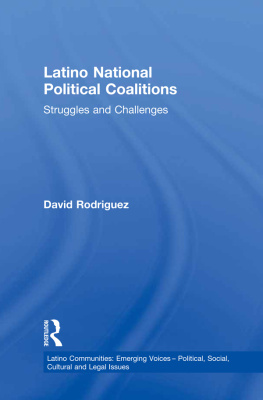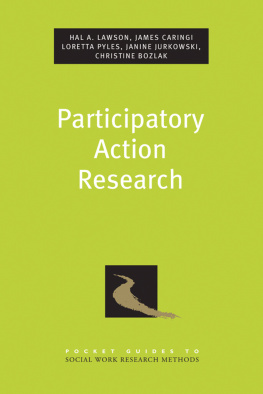Latino Social Policy
A Participatory Research Model
Latino Social Policy
A Participatory Research Model
Juana Mora, PhD
David R. Diaz, PhD
Editors
First published 2004 by Haworth Press, Inc.
This edition published 2014 by Routledge
711 Third Avenue, New York, NY 10017
2 Park Square, Milton Park, Abingdon, Oxon, OX14 4RN
Routledge is an imprint of the Taylor & Francis Group, an informa business
2004 by The Haworth Press, Inc. All rights reserved. No part of this work may be reproduced or utilized in any form or by any means, electronic or mechanical, including photocopying, microfilm, and recording, or by any information storage and retrieval system, without permission in writing from the publisher.
Cover design by Lora Wiggins.
Library of Congress Cataloging-in-Publication Data
Latino social policy : a participatory research model / Juana Mora, David R. Diaz, editors.
p. cm.
Includes bibliographical references and index.
ISBN 0-7890-1759-8 (hard : alk. paper) ISBN 0-7890-1760-1 (soft : alk. paper)
1. Latin AmericansResearchCaliforniaLos Angeles. 2. Latin AmericansCaliforniaLos AngelesSocial conditions. 3. Latin AmericansResearchMexico. 4. Latin AmericansMexicoSocial conditions. 5. Action researchCaliforniaLos Angeles. 6. Action researchMexico. 7. Los Angeles (Calif.)Social policy. 8. MexicoSocial policy. I. Mora, Juana M. II. Diaz, David R., 1951-
E184.S75L3637 2003
305.868079494072dc21
2003001811
Dedication and Acknowledgments
Dr. Mora
I would like to dedicate this book to all the community workers and promotoras whom I have met over the years. Your grassroots efforts are my hope for the future.
I would also like to acknowledge the tremendous support and assistance from my co-editor, Dr. David Diaz, and my husband, Dr. Kent Kirkton who supports all my efforts.
Dr. Diaz
Finally, Bobby Rider, you will forever be spending those wonderful afternoons sailing over the skies of Laguna Beach with Francine Marie, sharing laughs, those bright smiles, intense liberation discussions, memories, and love for us all.
Jimbo, you are with Russell, two Bioleys in lifes full circle, traversing the universe with our spiritual leader, Tio Walter.
CONTENTS
Juana Mora
David R. Diaz
Teresa Crdova
Olga A. Vsquez
Claudia Dorrington
Beatriz Sols
Vctor Garca
James Diego Vigil
Juan Munoz
Mara Teresa Vzquez Castillo
David R. Diaz
David E. Hayes-Bautista
Juana Mora
Juana Mora, PhD, is Professor in the Chicana/o Studies Department at California State University in Northridge. She is a nationally recognized expert on Latina/o culturally focused substance abuse treatment and prevention and has taught courses on Latino health, families, and women. Dr. Mora has been named an American Council of Education Fellow, has received the Hero of the Year Award during Hispanic Heritage Month from KCET public television and the Union Bank of California in Los Angeles, and is a former member of the Center for Substance Abuse Prevention National Advisory Council. She has published numerous journal articles and co-edited a special issue on substance abuse prevention and treatment for Latinas for the International Journal of the Addictions.
David R. Diaz, PhD, is Assistant Professor in the Chicana/o Studies Department at California State University in Northridge. He is an expert on urban planning and environmental impact analysis and works with community-based nonprofit groups in relation to urban policy and gang intervention programs. Dr. Diaz is a contributing editor to La Opinion, the leading Spanish-language newspaper in Los Angeles.
Teresa Crdova, PhD, is Associate Professor of Community and Regional Planning. She teaches foundations of community development, community planning methods, political economy of urban development, community economics, planning and organizing, and the seminar on thesis and professional project. Dr. Crdova is Director of the Resource Center for Raza Planning, a center within the School of Architecture and Planning that enables students to engage in research and policy analysis on issues affecting traditional communities in New Mexico. She sits on numerous boards and steering committees of community development corporations, planning organizations, and campus committees. She is the president of the Rio Grande Community Development Corporation, which serves the South Valley near Albuquerque. She works closely with the environmental justice movement and publishes on global/local relations, grassroots activism, and issues of community development. Professor Crdova, who received her PhD from the University of California, Berkeley, also publishes in the field of Chicana Studies.
Claudia Dorrington, PhD, MSW, is Associate Professor of Social Work in the Department of Sociology, Anthropology, and Social Work at Whittier College, Whittier, California. Her masters in social work and PhD in social welfare are from the University of California, Los Angeles, School of Public Policy. Her areas of interest are the provision of health and social welfare services to Latinos, immigrants, and refugees, particularly with regard to health promotion, service access, and the development of community-based organizations. Her current research is focused on HIV/AIDS prevention, Latino womens health prevention and health access, and Latino persistence and access to higher education. Her practice activities center on health promotion and early childhood and family literacy program planning and evaluation.
Vctor Garca is a cultural anthropologist at Indiana University in Pennsylvania, where he teaches courses on Latin America, peasant societies and economies, and Latinos and Latin American diasporas. Besides teaching, he is also the assistant director of ethnic and cultural studies at the Mid-Atlantic Addiction Training Institute on campus. His research interests include transnational labor migrations, political economy of industrial agriculture and farm work in the United States, and lately, alcohol abuse among transnational migrants in farming communities. Dr. Garcias research experience on Mexican farmworker populations and rural enclaves in California and Pennsylvania has brought him recognition as a leading researcher on these subjects. His findings have been published in book chapters and research reports, put forth in working papers, and presented in numerous papers given at national and international conferences.
David E. Hayes-Bautista is currently Professor of Medicine and Director of the Center for the Study of Latino Health and Culture at the School of Medicine, University of California, Los Angeles. He graduated from the University of California, Berkeley, and completed his MA and PhD in medical sociology at the University of California Medical Center, San Francisco. His research focuses on the dynamics and processes of the health of the Latino population using both quantitative data sets and qualitative observations. The Center for the Study of Latino Health combines these research interests with teaching of medical students, residents, and practicing providers to manage the care of a Latino base effectively, efficiently, and economically. His publications appear in




